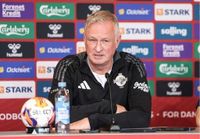On a cool Saturday evening at Copenhagen's iconic Parken Stadium, Northern Ireland faced a stern test against a talented Danish side in an international friendly that served as a crucial warm-up ahead of their FIFA World Cup 2026 qualifying campaign. The match, which kicked off at 6:00 pm BST and was broadcast live on the BBC, ended in a 2-1 victory for Denmark, but the game was far from a straightforward affair, showcasing the grit and promise of Michael O'Neill's young Northern Ireland squad.
For Northern Ireland, this trip to Scandinavia marked their second consecutive visit to the region ending in defeat, following a tough 5-1 loss to Sweden earlier in the year. Yet, the significance of these matches goes beyond the scoreline. O'Neill has strategically chosen challenging opponents like Denmark, ranked 21st in the world and sitting 50 places above Northern Ireland, to prepare his team for the rigors of World Cup qualifying. "This is as tough a test as we can expect to get," O'Neill remarked during a press conference at the Parken Stadium, highlighting the serious approach both teams brought to the pitch.
The Northern Ireland squad, marked by youth and potential, featured an average age of just 22.6 years, with nearly half the players aged 21 or under. This youthful energy was evident from the outset, as Sunderland defender Trai Hume captained the side, continuing his leadership role from previous international windows. O'Neill emphasized a leadership group philosophy rather than a fixed captaincy, including players like Conor Bradley and Shea Charles in this core. Unfortunately, the squad was without Paddy McNair, a key experienced figure sidelined by a groin injury sustained in training and who returned to his MLS club, San Diego FC, for treatment.
The Danish side, under the guidance of head coach Brian Riemer—who took charge in October and was managing his fifth game—brought a blend of seasoned veterans and emerging talents. The squad boasted Premier League stars such as Christian Eriksen, Patrick Dorgu, Rasmus Hojlund, Christian Norgaard, and Mikel Damsgaard, alongside Bundesliga stalwarts Joakim Maehle and Rasmus Kristensen. Kasper Schmeichel, now with Celtic, provided experience between the posts, while Pierre-Emile Hojbjerg added midfield steel. Riemer, formerly Thomas Frank's assistant at Brentford, has been imprinting a fresh style on the team, aiming for "expression and performance" as much as results.
The match itself was a gripping encounter. Plymouth Argyle keeper Pierce Charles replaced the starting goalkeeper at halftime after a first-half collision with Denmark's Rasmus Hojlund forced treatment and withdrawal. Charles quickly made his presence felt, making a crucial save ten minutes into the second half by tipping Christian Norgaard's header around the post. The defensive efforts of Ballard and Bradley were vital, clearing Danish attempts off the line from the ensuing corner, underscoring the pressure Northern Ireland faced.
Denmark's breakthrough came with 23 minutes remaining when Christian Eriksen, who is set to leave Manchester United this summer, capitalized on a loose ball following a sequence involving Isaksen, Trai Hume, and Ballard. Eriksen, ever the midfielder with a knack for timely interventions, tapped home to put the hosts ahead. The goal was a testament to Denmark's quality and clinical edge.
Despite the setback, Northern Ireland showed resilience. Isaksen forced Charles into a diving save shortly after, while substitute Mika Biereth saw a headed goal disallowed for offside as Denmark intensified their push. Northern Ireland's most promising attacking moments came from Isaac Price, whose speculative long-range effort flew over the crossbar and whose superb free-kick had earlier earned a 1-1 draw against Switzerland in March, a match that had hinted at the squad's potential.
Michael O'Neill's men will look to build on this experience as they prepare for their next friendly against Iceland at Windsor Park in Belfast on Tuesday, June 10, 2025. These matches serve as vital dress rehearsals before the World Cup qualifiers kick off in September against Germany, Slovakia, and Luxembourg. O'Neill noted that the Copenhagen fixture was as close a simulation as possible to their upcoming qualifier in Cologne against Germany, given the similar stadium environment.
Reflecting on the team's progress, O'Neill acknowledged the lessons learned from recent defeats, especially the heavy loss to Sweden, stressing the importance of gaining experience now rather than during the qualifiers. The squad's youth movement continues, with six uncapped players gaining valuable minutes and exposure at the international level.
Denmark, for their part, had been on the cusp of a Nations League finals appearance earlier in the year, holding a 3-2 aggregate lead against Portugal with mere minutes remaining before a late turnaround saw them exit 5-3 on aggregate. Their home form remains formidable, with six wins in their last seven matches at Parken Stadium, the sole loss being a narrow defeat to reigning European champions Spain.
For Northern Ireland, the visit to Denmark is a return to a venue that once brought heartbreak nearly two years ago during a Euro 2024 qualifier. Back then, a late equalizer by Callum Marshall was ruled out after an extensive VAR review, a decision O'Neill publicly criticized. Since that time, the team has transformed, losing only three of their last 13 matches and building a foundation of confidence heading into the autumn campaign.
As the international break continues, Northern Ireland's focus turns to the upcoming clash with Iceland, where they will seek to carry forward the lessons from Copenhagen and sharpen their competitive edge. The blend of youth, leadership, and experience under O'Neill's stewardship aims to propel the team toward a successful World Cup qualifying journey.
Meanwhile, Denmark will look to maintain their momentum and continue integrating their evolving squad under Brian Riemer’s guidance, balancing the desire to win with a commitment to expressive, performance-driven football.






